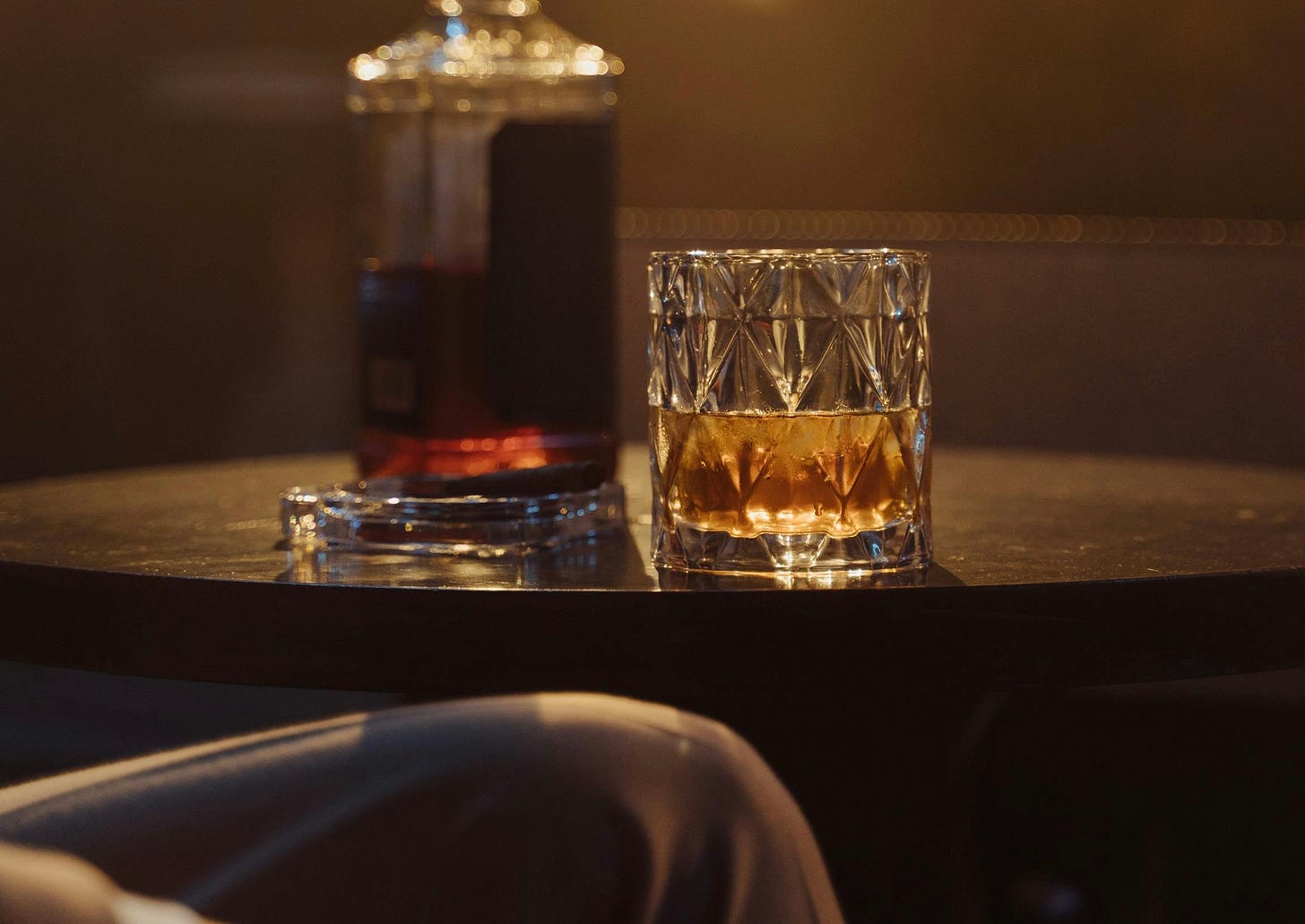The Blues & Billie Armstrong 50
TWO CAGES
Previously in The Blues & Billie Armstrong…
I turned off the phone and placed it face down on the kitchen counter, drained the glass of bourbon and went to the bedroom and swapped the pjs for a pair of khakis, a hoodie and some slip-on sneakers. I grabbed my wallet and keys on the way to the door, pulled the hood up around my face and walked out into the gray city day.
My original plan was simply to catch my breath in neutral territory so to speak, a favorite bar in the Outer Sunset called Remo’s.
A dark old place of smoke-stained wood, red tuck and roll and a pool table under a beer light. A workingman’s dive well past its peak earning years, where two strangers drinking in silence at opposite ends of the bar are actually engaged in a form of male bonding, and a fresh drink can be ordered with nothing but a chin nod.
Just a couple stiff drinks in the cool and understanding shadows—to relieve the tightness in my chest, organize my synapses and consider next steps. Of course Valentine Jones was right—I knew things I’d never told the authorities (or anyone else) back in that summer of 1970. Or since. And some of what I knew might help clear Billie Armstrong’s name. But I also knew it wouldn’t be that simple. Not for me. And not for Valentine Jones and her client.
I spent the next two nights in a holding cell before the County of San Francisco got around to properly booking me.
I didn’t complain. I didn’t call a bailbondsman or anyone else. I didn’t want any help, and I didn’t want any questions. But I didn’t know about the video yet.
I was released on my own recognizance Monday morning, narrowly escaping a public arraignment and most likely a black-robed lecture about the point-two-five I’d racked up on the Breathalyzer. In return for my release, I was required to sign a paper accepting a later date with the court, at which my attorney could appear in my stead. My California Driver’s License was confiscated, and I was issued a piece of paper to serve as a temporary license, good only until my court date.
There’s a whole lotta woulda-coulda-shoulda to be heard (or said) in the drunk tank at your local jail. I would’ve been better off if I hadn’t gone to Remo’s. I could’ve saved more than money. I should’ve known Valentine Jones wasn’t going away on the strength of my whiskey’d obstinance. But woulda-coulda-shoulda just means you didn’t. Or so I was taught.
It was six Benjamins to get the Cadillac out of the impound lot. The shallow indentation I’d left in the hood wasn’t as impressive as the swollen red knuckles on my right hand, but at least the knuckles would heal for free.
I should've hit myself in the face instead of punching my car. That’s the way I would’ve handled it as a kid, but as an adult I’d learned to divert my flares of self disgust to inanimate objects. Through the years, I’d built a small collection of damaged treasures—a beautiful acoustic guitar with a gaping splintered hole left by a thrown bottle; a laptop with a spider-cracked screen after a tailspin flight across the bedroom, the sheetrock scar still covered with a framed Edward Hopper print; and now a fist-sized dent in the hood of my Cadillac that would probably hit my wallet for a grand at the body shop.
I was right about one thing. Hanging up on Ms. Jones had only pissed her off. When I got back to my apartment and my phone, there was a string of texts from her, ranging from a polite suggestion that we’d been disconnected, to a heated disparagement of my fundamental moral character. Except for the one jagged detail—that she was Billie Armstrong’s daughter—I would have called my own lawyer and stepped out of the path of these flames.
But the truth is, I had it coming. I’d had it coming for forty years. I’d almost convinced myself that I’d left the past behind. You can run through life dogged and headlong, arms pumping, determined to outrun your ghosts, but the bastards keep pace without breaking a sweat.
I had it in my head that showing up at the Sentinel that morning would provide some cover once the arrest inevitably became public knowledge.
My colleagues and my bosses (and their bosses) would be inclined to dismiss the entire episode given that I’d come to work so soon afterward and appeared to perform with my usual shaggy competence. In future conversation I would shortside my Breathalyzer results by at least half and suggest the whole thing was a typical example of nanny-state overreach. The pinstripe overlords would nod sympathetically, and interest would quickly subside.
And I imagined, during this perfunctory appearance, I would also call Valentine Jones. Now that I was sober, humbled, and somewhat unnerved by the prospect of her hunting my secrets, I had to apologize for hanging up and try to negotiate a compromise.
Yes, I had information I’d been withholding for decades. Yes, I wanted to help. But. I had my own ass to cover, and I was feeling a bit of a chill back there. Surely an experienced attorney like Ms. Jones would understand my desire to protect myself from any possible charges or damaging public exposure. (Hopefully she would never have to know I was trying to protect her as well.)
And, given a little more time, I would have called and tried to work something out. I swear. But, as it happened, Valentine Jones and Billie Armstrong had other plans.
I wasn’t required to show up at the Sentinel Building on Union Square. I was technically an independent contractor—that’s how it’s done these days, to save the faceless shareholders the cost of a benefits package. At least, that’s how it was done at the Sentinel.
But they’d given me a tiny office in the corner of the newsroom, a space no bigger than a walk-in closet up in Pacific Heights, with no windows and a front wall of glass that exhibited me like a zoo animal. Here is the legendary Ink-stained Wretch, one of the last alive in captivity. And the digital children on the other side of the glass fingered their devices and stare at their celebrated analog ancestor, and they imagined this heritage somehow ordained them as principled journalists rather than clickminded typists mushed by dollarhearted tyrants like Daniel Lockhart.
I wasn’t in the office every day. A lot of a columnist’s job is in the head and feet and eyes and ears. I had to move around and listen and watch and eat and drink the City. And the rest—the writing and polishing, fact-checking and bureaucratic politicking—even by then could be done electronically from almost anywhere. But there was always something about being in the newsroom that quickened my inky blood—the ringing of phones, the squabble of reporters’ questions, and the tap-tap of keyboards. It all seeped into my glass cage and diffused into a comforting hum.
I’d been with the Sentinel twenty years. People said good morning when you came to work, they’d nod or wave, the intern from j-school might stop by with donuts. After the Pulitzer was announced, even the strangers said hello. But that morning, the day after my two-day incarceration, there was not a word as I made my way through the newsroom, not a word. All eyes were riveted to screens or notepads, or squinting officiously into desk drawers—a veritable gauntlet of performative bustle, with a smattering of what I could have sworn was repressed laughter.
I still didn’t know about the video.
I wasn’t two seconds in the Aeron chair behind my desk when Tom Monihan walked into the room without a knock. He shot me a Spock-like raised eyebrow and closed the door slowly and carefully as if he didn’t want the click of the latch to wake up a suspicious wife.
“You got a serious pair of stones, King,” he said. “I did not figure you showing up today.”
Monihan is a tall, ponderous Black man with a shaved head and gray goatee. He had been managing editor at the Sentinel long enough that he was the one who hired me. And we go back even further—he was the “wise old editor” in the story I’d told at the banquet, though the line was a bit of a private dig, as he’s only a few years older than I.
“You might want to disappear before Lockhart finds out you’re here,” he said. “A couple days to cool off and he might not fire your ass.”
I gave him a clueless what-the-fuck shrug.
Monihan pulled his head back in disbelief. “Damn. You haven’t even seen it?”
He moved behind the desk and rolled my chair aside with me in it. He commandeered my mouse and stood at the computer rapidly clicking here and there on the screen.
My eyes caught up to the cursor when the YouTube homepage appeared and Monihan clicked the play button on a video posted by some kid wearing a Dodger hat in his profile pic.
The Blues & Billie Armstrong is a work of fiction. Names, characters, businesses, places, events and incidents in this book are either the product of the author's imagination or used in a fictitious manner. Any resemblance of the fictional characters to actual persons, living or dead, is purely coincidental.
© All Rights Reserved



